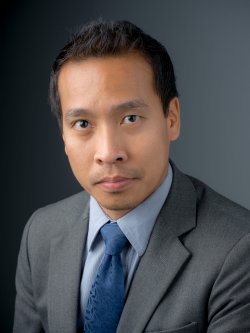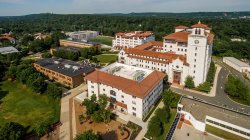Dr. Pablo Tinio
Associate Professor, Department of Educational Foundations
Posted in: Spotlights

Dr. Pablo Tinio
What was your college experience like?
My college experience was quite diversified. I started my college education in the U.S. and ended it in Vienna, Austria. Because of this, I was exposed to very different approaches to education. I was in school for a while so I took many, many courses. The ones I remember the most are the ones that I really connected with and where the professor was really engaging or did something memorable. Something I remember and think back to a lot are the “extras,” such as my involvement in student groups and organizations like the university paper, working with professors on research, socializing with other students, and exploring fields outside my major, which is how I ended up with a minor in Biology. To me, those things really made my college experience well rounded and memorable.
Did you go to college with the intention of being a professor? If not, how did your path bring you here?
I did not go to college with the intention of being a professor, although I always knew that it was a possibility. I loved psychology, education, and art, so I simply took classes in those areas thinking that maybe I’ll eventually figure out what to focus on. When I started working on my first Master’s degree, two of my professors suggested that I consider teaching at the college level, which is what I started doing while also working in schools and doing research. The teaching and research and big opportunities came together nicely. And here I am!
What is one thing you wish you had known in your undergraduate/graduate career? Why?
The one thing I wish I had known during my undergraduate career is that professors are really open to involving students in their own work, whether that is in their teaching or research. It was not until I was almost finished with my undergraduate work that I realized this. I could have been more involved. Having students work with you is one of the best things about being a professor. It really helps the students as well because they are exposed to so many different experiences and they can begin to expand their professional network quite early on in their careers. Good connections could make a difference when you’re applying to graduate school or even a job. Getting involved gives you quite an advantage and makes college more fun.
What is the best part about being an MSU faculty member?
Besides the beautiful campus and the fried chicken at the Student Center Dining Room, it’s definitely the students. I love the diversity of backgrounds, experiences, and perspectives that the students bring to the classroom. They have such great energy—a bit of anxiety, often a lot of stress, but generally positive vibes. We have a lot of fun in my classes. Next to students, there are my colleagues, who are very supportive of each other and who really care about the students.
What does a typical day look like for you?
I typically start my work day by chipping away at the hardest thing on my to-do list. It sets the tone for the day. Then I meet with students or colleagues, work on research, and teach. I end the day by reviewing my to-do list, crossing out what I accomplished, and then quickly reviewing what needs to be done the next day so that there’s little ambiguity as to what’s coming. Of course, all of the above is built around finding time for self and family.
What are a few of your recent accomplishments?
I finally figured out the best time to find parking on campus, which was a real game-changer. I was also just recently elected as Fellow of the American Psychological Association, which is something that I did not expect this early in my career. But I am extremely honored by the distinction. I also recently received several awards for my research.
What is your favorite class to teach at MSU? Why?
I should probably say that I love all of my classes equally. However, I do love to teach Psychological Foundations of Education because a lot of what I teach is new to the students, so there’s good energy and excitement to the class. The class also involves the students self-reflecting on their own histories as learners and their strategies for learning. They become stronger learners as a result of the class. For a graduate class, I enjoy teaching Advanced Methods in Quantitative Inquiry, a.k.a. advanced statistics, a doctoral-level class. It’s an intense class that many students initially find very intimidating. In the end, they all come out OK and actually find statistics quite interesting.
What advice would you give to incoming students in order for them to succeed?
The advice that I would give to incoming students when trying to get something done is to stop trying to do your best. This might sound counterintuitive, but “your best” is not specific enough. Instead, think about putting in the hours. Put in the hours. It’s easy to count hours, but it’s hard to count best: “I tried my best to study for the final” vs. “I studied 10 hours for the final.” If you fail, add more quality hours next time around (and change your strategy); if you succeed, just do the same thing or dial it down a bit, which would give you more time to do other things. Another advice I would give is to be open to new experiences. You might find that you are interested in an area that you never thought about before but one that could become very meaningful to your life and your college experience.
